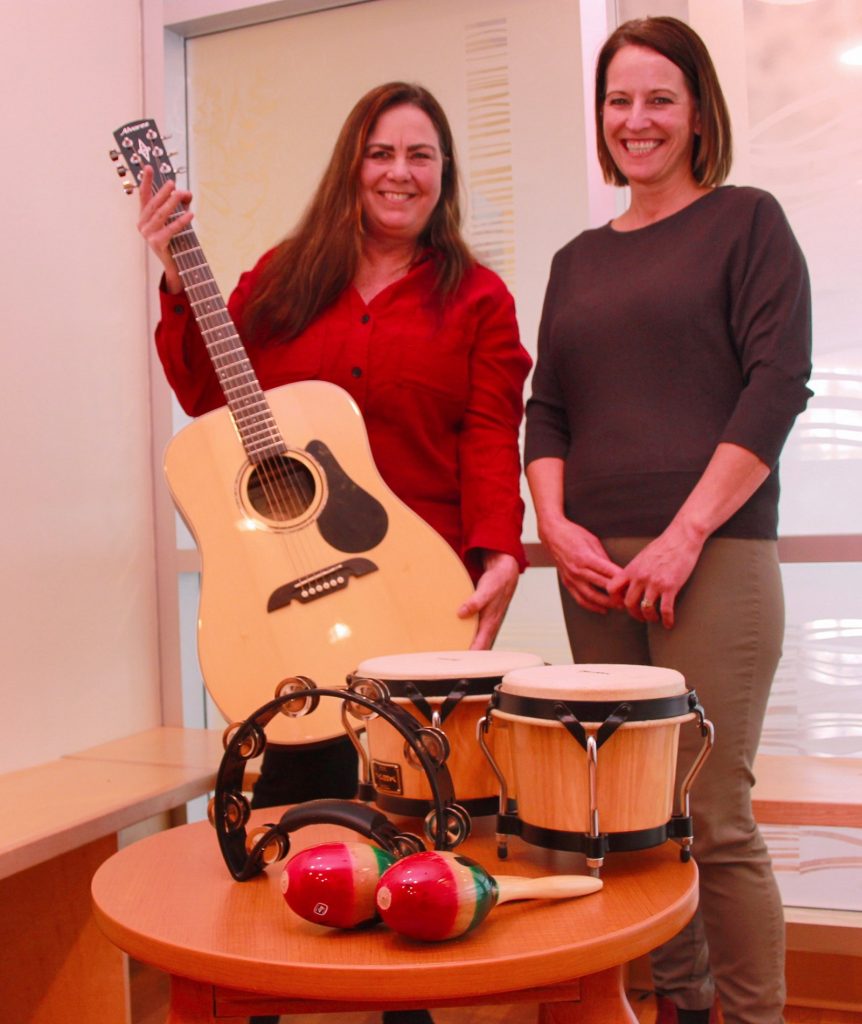Family CARE Grants Expand AMH’s Musical Expression Programming
by Graham Strong
 Donna Ross (left) and Joelle Macey said that new instruments for the Adult Mental Health program will help patients build self-esteem through creativity. “Music gives people a voice.”
Donna Ross (left) and Joelle Macey said that new instruments for the Adult Mental Health program will help patients build self-esteem through creativity. “Music gives people a voice.”Music can be a powerful healer for those struggling with mental health. That’s why the Adult Mental Health (AMH) program at the Thunder Bay Regional Health Sciences Centre incorporates music into its therapeutic group sessions.
“Music expression can be cathartic – you’re getting your feelings out without actually having to speak it,” said Joelle Macey, AMH Acting Manager. “Not everyone wants to tell their story.”
Previously, patients would share a song that was meaningful to them as a way to express their emotions. But thanks to a Volunteer Association/Thunder Bay Regional Health Sciences Foundation Family CARE Grant, the AMH program is expanding the program into new areas. Now, patients can play their own music on instruments including a guitar, drums, and maracas.
“Music gives people a voice,” said Donna Ross, a Therapeutic Recreationist in the AMH program. “It’s a form of creativity and self-expression. They get excited about sharing.”
That helps build self-esteem. Ross told of one patient she was talking with who just picked up the guitar and started playing. “I said, ‘Wow, are you ever good!’ and he just lit up. He talked about how he struggles with confidence, which leads to his feelings of depression and suicidal thoughts, and how writing and playing songs helps him feel better about himself.”
Not only did the guitar help boost his self-confidence, it led to another way for him to connect with Ross and open up about his emotions.
The instruments also allow people to play together. Group sessions provide their own benefits.
“When we create songs together with the musical instruments, we learn how to adapt, how to work as a team, how to listen to one another, and how to voice our thoughts,” Ross said. “It helps improve many aspects of one-on-one relationships.”
Drumming is another aspect of the program and is an important part of traditional Indigenous healing. Michael Robinson, one of the Hospital’s spiritual care providers, taught some patients how to build a traditional drum.
The 30-bed AMH unit provides acute inpatient mental health care to patients across Northwestern Ontario. Patients may have some form of psychosis or severe depression and sometimes have thoughts on harming themselves or others. The average stay is about nine days, but some patients can stay for months, depending on their situation.
Group sessions including musical expression allow patients to get to know each other better. It also helps boost self-confidence and self-esteem, which are at the heart of feeling better. Coming together relieves feelings of isolation and helps them realize they are not alone.
“Normally, people in the mental health ward are often caught up in the thoughts in their head. The music provides a distraction and lets them relax,” Ross said. “When we’re sitting back listening to music or playing it, they’re not going to be thinking about all the stresses that they normally think about.”
The AMH program purchased the instruments thanks to donations to the Family CARE (Care Advancements Recommended by Employees) Grant. This special grant allows frontline staff to identify health care improvements at the Hospital, then provides funding to make it happen. You can help! Donate to the Family CARE Grant program today at healthsciencesfoundation.ca/donate or by calling our Donation Centre at (807) 345-4673.
The AMH program is also accepting donations of instruments that are in good working order. Please call 807-684-6440 for more information.
Applications for the 2020 Family CARE Grants are being accepted until October 23. Employees of the Thunder Bay Regional Health Sciences Centre can find application forms at healthsciencesfoundation.ca/familycare.